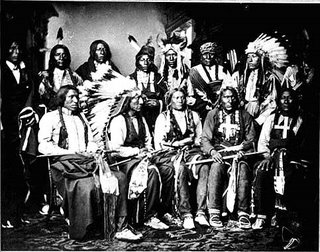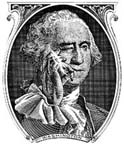3.21.2006
 Filling the void
Filling the voidin Indian law doctrine
by: Editors Report / Indian Country Today
March 17, 2006
The U.S. Supreme Court has made ''a mess'' of Indian law, to quote one prominent scholar. After decades of increasingly arbitrary decisions, the closest thing it has left to a basic principle is the almost totally discredited ''doctrine of discovery.'' This artifact of 16th-century European rivalries was shaky enough when Chief Justice John Marshall reluctantly made use of it in 1823. We doubt that it will survive scrutiny in a forthcoming book by Indian Country Today Columnist Steven Newcomb.
In a recent human rights report, the U.N. Committee on the Elimination of Racial Discrimination expressed astonishment that U.S. Indian law still relied on this colonial relic. Without this justification for federal/tribal relations, the court will be operating in a dangerous intellectual vacuum. As ICT pointed out in '''Mental correction' at the court,'' (Vol. 25, Iss. 40), professor Robert A. Williams wrote: ''Filling that void is perhaps the greatest challenge confronting Indian rights lawyers, scholars, advocates and the Court itself today.''
The first step in this task is to return to the beginning. And to our amazement, we find that in the first decades after the initial contact was made, theologians in the first great European invasion of the Americas were working out principles for relations with the indigenous population that gave greater weight to Indian rights than the Supreme Court has done in the first years of the 21st century.
Relying on the teachings of Aristotle and Thomas Aquinas, Dominican theorists of 16th-century Spain produced a code of conduct toward the Indian nations that compares favorably with the Anglo-American tradition. The leading thinker, Francisco de Vitoria (1485? - 1546), expressly repudiated the doctrine of discovery. Sadly, this teaching was honored mainly in the breach, and it originated in reaction to horrendous atrocities. But the story deserves to be studied widely in Indian country and to be brought to the attention of Supreme Court justices at every opportunity.
It began with the arrival of Dominican missionaries in Hispanola in September 1510. Horrified by what they saw happening, they made a public protest in a famous Advent sermon in December 1511, delivered in the presence of the leaders of New Spain. ''Are the Indians not men?'' said the chosen orator, Antonio de Montesinos. ''Do they not have rational souls? With what right do you keep them in this servitude? With what authority have you waged these detestable wars against these people who lived peacefully in their own lands?''
The sermon was a bombshell. Diego Columbus, Christopher's heir as viceroy, complained directly to Spain's King Ferdinand and threatened to expel the Dominicans. The controversy in Spain mobilized the considerable intellectual resources of the Dominican Order.
Perhaps the leading theologian of the day was de Vitoria, professor at the University of Salamanca. He addressed the rights of the Indian nations and the basis of Spanish rule in the New World in two treatises written in 1532, which are now considered key to the emergence of international law. The first relectio ''On the Indians Lately Discovered'' begins with a justification for questioning a fait accompli. ''When we hear of so many massacres, so many plunderings of otherwise innocent men, so many princes evicted from their possessions and stripped of their rule, there is certainly ground for doubting whether this is rightly or wrongly done.''
Following the disputational style of Aquinas and the medieval scholastics, de Vitoria took up the standard arguments for subjugating the indigenous peoples, ''that they were sinners or were unbelievers or were witless or irrational,'' and refuted them. The fact they had no knowledge of Christianity or practiced sinful customs, not even human sacrifice, had no bearing on their inherent right to self-rule. De Vitoria turned to Aquinas' basic premise, that natural law was rooted in universal human reason, as opposed to divine law, which derived from revelation. Political authority derived from the Creator in the sense that he had made man as a political animal, with a natural tendency to live in a social order. The Indian nations fully satisfied the criteria for political dominion, for what we now call sovereignty:
''They are not of unsound mind, but have, according to their kind, the use of reason. This is clear, because there is a certain method in their affairs, for they have polities which are orderly arranged and they have definite marriages and magistrates, overlords, laws and workshops, and a system of exchange, all of which call for the use of reason; they also have a kind of religion.''
Indians might say we don't need a theologian to tell us we can take care of ourselves, thank you very much; but de Vitoria's audience was a kingdom that was stealing great wealth from the Native nations. In the midst of this record of blood and greed, his admonition is startling: ''The upshot of all the preceding is, then, that the aborigines undoubtedly had true dominion in both public and private matters, just like Christians, and that neither their princes nor private persons could be despoiled of their property on the ground of their not being true owners.''
This left the problem of justifying the Spanish presence in the New World, and de Vitoria was equally bold in demolishing the ''Seven False Titles'' for Spanish rule. Neither the Holy Roman Emperor nor the Pope could grant it, since their authority didn't reach this newly discovered non-Christian world. Discovery itself was meaningless, even though Columbus relied on it. It granted title only to the first arrivals in a deserted region; and the Indians were there first. This title ''in and by itself ... gives no support to a seizure of the aborigines any more than if it had been they who had discovered us.''
Even conversion of unbelievers wasn't a sufficient excuse. Conversion by force of arms was illegitimate, and Indians had no obligation to accept a religion that the Spaniards they met were observing so poorly. Ultimately, of course, de Vitoria did justify Spanish rule, but his grounds are still surprising. Indian princes, he argued, had allied themselves voluntarily with the conquistadors to pursue their own wars, ''as the Tlaxcaltecs are said to have done against the Mexicans.'' This was the mechanism for the expansion of the Roman empire, which the church approved as lawful.
We admit that we present the most humane of Vitoria's conclusions. Much of his argument is densely medieval, and he calmly presents the pros and cons of some distasteful conquistador prejudice. But the results vindicate his spirit. He set the intellectual ground for the remarkable career of fellow Dominican Bartolome de las Casas, a veteran of the New World expeditions, who devoted most of his long life to the defense of the Indian peoples. De las Casas envisioned a Spanish dominion over sovereign Indian nations, whose rights of self-government derived from Thomist natural law.
This is a vision far closer to the North American Indian insistence on tribal sovereignty than any of the doctrines now shaping Supreme Court decisions, such as that of discovery or the plenary power of Congress. Perhaps under new Chief Justice John Roberts the court might be receptive to the philosophic coherence of de Vitoria. There is the making of a Thomist bloc on the court, with Roberts, Samuel Alito and Clarence Thomas, which might be willing to accept a ''natural law'' foundation for tribal rights.
Lawyers with the Tribal Sovereignty Initiative are understandably reluctant to prod the court to a basic shift in its thinking. Their approach so far has been conservative, to reduce the damage the court has shown itself highly capable of inflicting. But the present intellectual void in the highest tribunal on Indian law can only lead to future disasters.
We should close with the caveat that nothing human is totally pure. For all its courage in defending the Natives of the New World, the Dominican Order in Spain was also the agent for the fearsome persecution of heretics and secret adherents of Judaism. The much-admired humanity of de las Casas and de Vitoria has been obscured in historical memory by the fanaticism of Tomas de Torquemada. Still, it is astonishing that the 21st-century Supreme Court has shown a less principled regard for Indian rights than did the folks who gave us the Spanish Inquisition.
© 1998 - 2006 Indian Country Today
********************************************************************************
URL: http://indiancountry.com/content.cfm?id=1096412659
